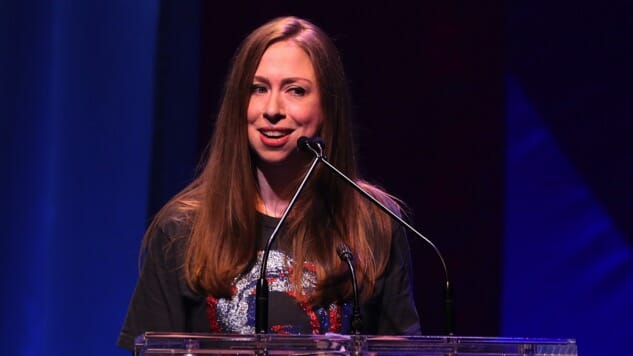Let’s Nip This Chelsea Clinton Thing in the Bud While We Can
Photo by Justin Sullivan
Chelsea Clinton, who runs a foundation and is a mom in New York, has received a glut of media coverage lately. Since Trump took office, outlets like The Hill, Politico, and The Washington Post haven’t missed an opportunity to publish (endless) stories about her Tweets, the spinach pancakes she made, and, of course, speculate about a hypothetical run for office. The Hill has published some 70 articles about Clinton this year alone.
But before we cover 2017, it is worth backing up to last summer when The Atlantic’s Michelle Cottle followed Chelsea on the campaign trail and described her “uneasy” relationship with the media. “She is very much her mother’s child,” Cottle writes, as she is “methodical, deliberate, cautious, detail-oriented, and disciplined.” Later in the piece, Cottle points out that the word “poised . . . is the word used to describe Chelsea more than any other.”
Reading the coverage of Chelsea Clinton(‘s Tweets) this year, you might notice a different group of adjectives being hurled around to describe—or, sell, if we’re being honest—an almost different person. Politico wrote, “Chelsea Clinton has discovered something new since Inauguration Day: a spicy, sarcastic online personality.” The Washington Post said her Twitter account was “getting saltier,” and later described it as “edgy.” CNN added that Chelsea “embraces her Twitter sass.”
After feeling like my day lacked spice, I decided to check out Chelsea’s Twitter feed and try some of this digital sodium for myself. Visiting on Sunday, March 19th, I noticed a retweet from C-SPAN2’s Book TV account before I scrolled down and found Clinton’s edgy voice I had heard so much about. This retweet didn’t contain any sass—some might have even found it bland, but it did provide a window into Chelsea’s worldview. It said Chelsea and Devi Sridhar, a Global Public Health Professor and Chair from the University of Edinburgh’s Medical School, were going to “examine the role public-private partnerships are playing in improving global health” on C-SPAN2 at 11 on a Saturday night. Surely a snoozefest when given the option to watch SNL’s “salty” treatment of Trump and his cronies at the same time. But the confluence of “global health” and so-called “public-private partnerships” are the bedrock of not just understanding Chelsea Clinton but also what many have dubbed “Clintonism,” the pro-corporate ideology that binds the Clintons and their “charitable” foundation together.
Another favorite media talking point, that Cottle and others tend to harp on, is the fine line Chelsea walks between being permanently stuck in her parents’ shadows and forging her own path. We’ve heard about her stints in consulting, a part time (and $600k/yr) gig in television journalism, a post she’s held in academia, and not to mention degrees from Stanford, Oxford, and Columbia, where her graduate work focused on global health. Despite any trouble she’s had forging a path—she now holds a position at and a seat on the board the family foundation—Chelsea has been consistent in at least one place: her embrace of a neoliberal worldview, one where corporations forge “partnerships” with the state to solve its many problems. Or, said more bluntly, the objective of neoliberalism is for the state to auction off its core functions to private hands.
The speeches she frequently gives at public universities are examples of Chelsea performing this type of wealth transfer. When the University of Missouri-Kansas City couldn’t afford Hillary Clinton’s exorbitant 275k speaking fee, they decided Chelsea’s 65k was more reasonable. Responding to The New York Daily News, a spokesperson for the Chelsea Clinton pointed out she gives all of the proceeds from her speeches to her family’s foundation, thus moving taxpayer funds to the Clinton Foundation, an unambiguously neoliberal project which acts on the belief that unaccountable wealthy Americans should decide health policy for the entire planet.
Naomi Klein, in a column for The Nation, explained the theory and worldview behind the Foundation.
The mission of the Clinton Foundation can be distilled as follows: There is so much private wealth sloshing around our planet (thanks in very large part to the deregulation and privatization frenzy that Bill Clinton unleashed on the world while president), that every single problem on earth, no matter how large, can be solved by convincing the ultra-rich to do the right things with their loose change. Naturally, the people to convince them to do these fine things are the Clintons, the ultimate relationship brokers and dealmakers, with the help of an entourage of A-list celebrities.
-

-

-

-

-

-

-

-

-

-

-

-

-

-

-

-

-

-

-

-

-

-

-

-

-

-

-

-

-

-

-

-

-

-

-

-

-

-

-

-








































